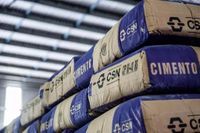In a significant financial report released on May 8, 2025, CSN (Companhia Siderúrgica Nacional) and its subsidiary CMIN (CSN Mineração) revealed their first-quarter results for 2025, showcasing a mix of operational achievements and financial setbacks. CMIN reported a net loss of R$357 million, contrasting sharply with a profit of R$558 million in the same period last year. This downturn, attributed mainly to currency fluctuations affecting cash held in USD, has raised concerns among investors.
Despite the loss, CMIN's revenue increased by 21.7%, climbing from R$2.805 billion in Q1 2024 to R$3.412 billion in Q1 2025. The cost of goods sold also surged, rising by 18.4% to R$2.238 billion. Notably, CMIN's adjusted EBITDA rose to R$1.427 billion, marking a 27.1% increase from R$1.123 billion year-on-year, which reflects a strong operational performance amid challenging conditions.
On the other hand, CSN reported a net loss of R$732 million for the first quarter, a 52.5% increase in losses compared to the same period in 2024. However, CSN's operational metrics indicated positive trends, with an adjusted EBITDA of R$2.509 billion, up 12.3% from the previous year. The company's net revenue reached R$10.908 billion, also reflecting a 12.3% year-on-year growth.
CSN's steel shipments totaled 1.143 million tons, a 5.2% increase from the previous year, while CMIN shipped 9.6 million tons of iron ore, a 5.4% rise. The price for steel was reported at R$5,343 per ton, slightly below expectations, while the price for iron ore remained stable at US$62.0 per ton.
Financial analysts have reacted with caution to these results. The Goldman Sachs Group noted a mixed market response, highlighting ongoing concerns about cash burn and the path to deleveraging. As of May 9, 2025, CSN's shares fell by 6.85% to R$8.97, and CMIN's shares dropped 6.03% to R$5.77, reflecting investor apprehension.
Despite the reported losses, there were some encouraging signs. CMIN's EBITDA margin stood at 41.8%, although it showed a decline from the previous quarter due to seasonal factors. The adjusted EBITDA for CSN's steel division was R$485 million, with an EBITDA margin of 8%, demonstrating resilience despite the challenges posed by seasonal volume declines.
The cash cost (C1) for CMIN was reported at US$21.0 per ton, reflecting an 11% decrease year-on-year, which is a positive indicator of cost management. CSN's cash flow generation, however, was negative, with a free cash flow (FCF) burn of R$173 million, attributed to high interest expenses and capital expenditures. This situation led to a reduction in the net debt to EBITDA ratio, which fell to 3.3 times, signaling some improvement in financial stability.
Looking ahead, both companies face a challenging environment. The macroeconomic landscape remains uncertain, with ongoing volatility in commodity prices and increasing competition in the steel market due to rising imports. Analysts project a tight market for steel in Brazil, with domestic production expected to decline by 0.6% year-on-year and sales also projected to drop by 0.8%.
CSN's management has reiterated its production guidance for 2025, aiming for 42 to 43.5 million tons of steel, despite the competitive pressures. The company is focusing on operational efficiencies and market share retention strategies to navigate the current landscape.
In the cement division, CSN reported shipments of 3.2 million tons, with a selling price of R$344 per ton, reflecting competitive dynamics in the sector. The overall revenue from the cement division was in line with expectations, although the company acknowledged that the competitive environment has intensified, particularly in the Southeast region of Brazil.
In conclusion, while CSN and CMIN have faced significant challenges in Q1 2025, the operational performance in terms of revenue growth and cost management provides a glimmer of hope. Investors and analysts will be closely monitoring the companies' strategies to manage debt levels and improve cash flow as they navigate a complex market landscape.




